Wading through a sea of audit requirements can be a daunting and onerous exercise. It’s made easier by a consultancy like SkyVines that has helped food producers, packhouses and many others through the auditing process; they have experience of as many as 40 different audits coupled with a thorough knowledge of South African legislation.
Much of SkyVines’ work is within the South African fruit industry, but they also assist rooibos, olive and buchu farmers to obtain export accreditation and they have worked as far afield as the palm oil orchards of Gabon, West Africa.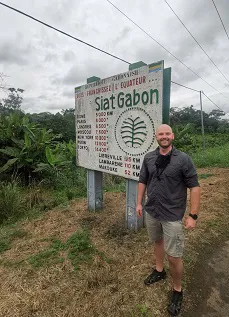 Like many audits, the company is divided into three parts: food safety headed by Juanè Jooste, health and safety headed by Henk Jooste and thirdly environmental monitoring, the division managed by Alheit du Toit, an entomologist by training.
Like many audits, the company is divided into three parts: food safety headed by Juanè Jooste, health and safety headed by Henk Jooste and thirdly environmental monitoring, the division managed by Alheit du Toit, an entomologist by training.
Right: Alheit du Toit in Gabon where SkyVines conducted Health & Safety (palm oil orchards and factories) and Road Safety visits
“I don’t think the consumer always knows what the producer and the farmer has to go through,” Alheit remarks.
Some of their clients obtain eight or nine audits every year which requires a vast amount of documentation. Especially for smaller growers, it can be daunting to prepare for an audit.
“At the moment, the biggest demand for environmental audits exists for audits such as SIZA Environmental, Rainforest Alliance, Rainforest Alliance Union of Ethical Bio Trade (RA UEBT) and SPRING (Sustainable Program for Irrigation and Groundwater Use).”
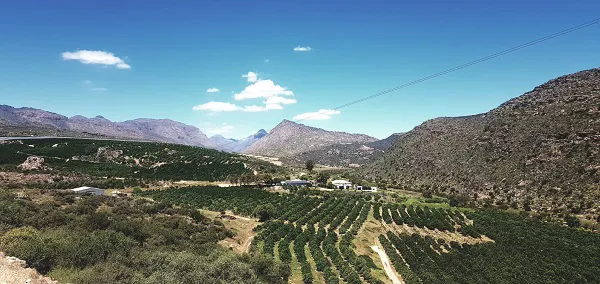
Getting the best out of a farm
SkyVines helps producers to become compliant to audit standards through putting management systems, based on best practices, in place.
“We tell them don’t multiply your efforts, go back to the basics. Many audits ask to see your water management programme, so don’t go drawing up different water management programmes for each audit - make a single one which is a good one, based on the strongest standards and based on South African legislation,” he advises.
“We coach them to get the best out of their farm – audits open the door to a wider world. But they will have to continue with the systems once we leave. Someone must be able to walk into the office and say: there was a food fraud problem, what are your risk procedures for this?”
There are monthly retainer visits by SkyVines consultants to help maintain the system throughout the year.
 Water management programmes are required by many audits
Water management programmes are required by many audits
The company has been hired by grower associations like the Citrus Growers Association and Hortgro to assist emerging farmers with obtaining accreditation for exports.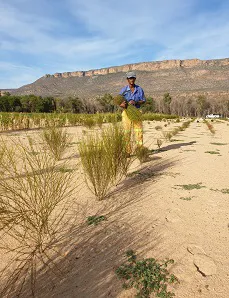 SkyVines has assisted producers of rooibos, buchu, olives, lemons and wine grapes to become organically certified.
SkyVines has assisted producers of rooibos, buchu, olives, lemons and wine grapes to become organically certified.
Right: rooibos tea cultivation
A first for the company is a recent request to help a tilapia farm become organically certified; whether that will be possible, they’re not yet sure.
Hot topics for the future
“Biodiversity in South African orchards is low,” Alheit observes, "but I expect that it will change. It’s become a hot topic, and buyers from retailers like Marks & Spencer, Albert Heijn, Aldi, Tescos are starting to ask about environmental practices on the farm. A farmer should know whether there might be endangered species on the farm or whether there is a wetland that should not be harmed.”
He has conducted research with the University of Leeds into cover crops and insect biodiversity in South African orchards, looking at, for instance South Africa’s indigenous bee species and their function in fruit production.
Alheit remarks that there is not as yet as much of a focus on bees and pollinators as there ought to be, but some fruit producers, like blueberry growers, spray at night to mitigate the risk to pollinators.
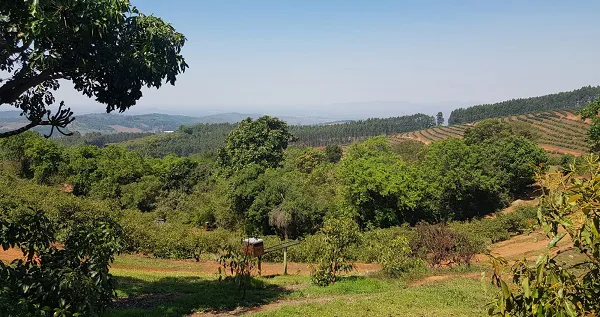 A beehive among avocado orchards in Limpopo Province
A beehive among avocado orchards in Limpopo Province
“I think the role of bees in the world is still underestimated,” he remarks; among the ad hoc services offered by SkyVines is the monitoring of alien plant specie removals, which often includes eucalyptus which, conversely, is the single most reliable source of bee forage year-round in South Africa.
Calculating a farm’s carbon will become commonplace 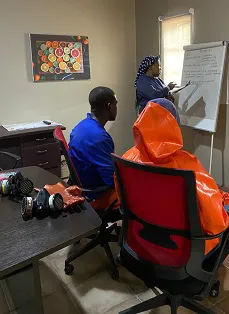 South Africa’s electricity grid is currently very unstable, which can derail a farm’s energy efficiency goals.
South Africa’s electricity grid is currently very unstable, which can derail a farm’s energy efficiency goals.
Diesel generators run many packhouses during the frequent, often planned power cuts (called loadshedding).
Right: Health & Safety training on a citrus farm
SkyVines helps producers to prepare data to monitor and measure a farm’s carbon footprint through a carbon calculator.
“The carbon tax will have a direct influence on producers as they will be taxed on their carbon footprint and the most important thing would then be to start to measure you carbon emissions through various tools.”
The best carbon calculator in his opinion is Confronting Climate Change (the CCC tool), the calculator developed by Blue North Sustainability. There are other freeware carbon calculators out there but one needs to do a bit of homework before selecting one.
“Once producers have started to capture the correct information to complete the CCC tool, they can start to look into investing in carbon tax offsets which can be cheaper than paying a carbon tax. As a producer of exporter you can reduce your business’ carbon tax liability even further by investing in carbon tax offsets from our eligible South African offset projects.”
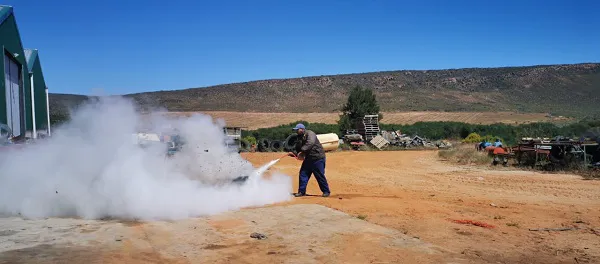 SkyVines hosts on-farm training, such as annual Emergency Evacuation training which includes fire extinguishing skills
SkyVines hosts on-farm training, such as annual Emergency Evacuation training which includes fire extinguishing skills
Waste management becomes mandatory
Another previously under regarded aspect, is that of waste management. “This has become another big topic on the farm and in the packhouse, for which we help prepare long term management plans.”
Last year South Africa adopted Extended Producer Responsibility (EPR) legislation that requires packaging suppliers to pay a mandatory levy towards the retrieval and recycling of the packaging. The ERP is aimed at decreasing total environmental impact from a product and its packaging, Alheit explains.
“I believe the Extended Producer Responsibility (ERP) will help encourage packhouses and exporters to look into more options on how they will manage their waste. To look and review their current waste management systems and practices that could result in a possible increase in recyclability and/or lower packaging usage."
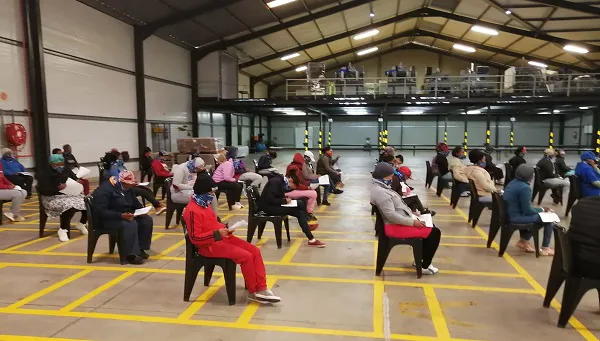
Induction of farm and packhouse workers form part of the British Retail Consortium audits which SkyVines facilitates For more information:
For more information:
Alheit du Toit
SkyVines
Tel: +27 82 410 4389
Email: quality2@skyvines.co.za
https://skyvines.co.za/
